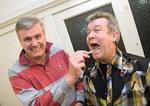Barnesy has the cheek - do you?
 Obstetrics & Gynaecology Obstetrics & Gynaecology
Do you have the cheek to help with cerebral palsy research? That's the question being asked by researchers from the University of Adelaide, who have launched a major national study that seeks to involve 10,000 Australians in a bid to better understand the possible genetic causes of cerebral palsy. The study - requiring cheek swabs of Australian mothers and their children - is the largest of its kind in the world. Australian music legend Jimmy Barnes, whose daughter Elly-May has had mild cerebral palsy all her life, has thrown his support behind the research. Jimmy has urged Australians - especially those whose children suffer from cerebral palsy - to participate in the study by sending an SMS with their name and address to a dedicated national study mobile phone number: 0439 201 795. One of the world's most serious complications during pregnancy and birth, cerebral palsy is a disability that affects one in every 500 children born in Australia, and the consequences are life long. The research is being led by Professor Alastair MacLennan, Head of Obstetrics & Gynaecology at the University of Adelaide and head of the South Australian Cerebral Palsy Research Group, the world's leading research group into the causes of cerebral palsy. PhD student Michael O'Callaghan is the national coordinator of the trial.
"Recent studies by our group suggest that cerebral palsy may be associated with genetic and other mutations that may increase blood clotting within the brain. An association between cerebral palsy and different types of herpes virus infection - such as cold sores and chicken pox - has also been discovered in South Australian studies," Professor MacLennan said. "The next step is to see if this is true in a much larger population, comparing the genetics of both mother and child," he said. "Such a study does not require a major commitment from Australian families - all we need is their support to obtain a cheek swab and to fill out a short survey." People with cerebral palsy lack control of their movement and posture as a result of brain injury in the neuro-motor region. The symptoms vary greatly in severity, ranging from poor muscle co-ordination to quadriplegia. Cerebral palsy is usually present from birth. The injury to the brain does not get worse over time. "It was once thought that cerebral palsy was caused by low oxygen levels during birth. However, this is rarely the case," Professor MacLennan said. "Obstetric care and caesarean deliveries have increased six-fold over the last 50 years, but the incidence of cerebral palsy cases has remained the same. Most of the cases are associated with problems during pregnancy and possible genetic susceptibility. Currently there is no cure or way to prevent cerebral palsy," he said. "If our research confirms that there are genetic mutations that can lead to cerebral palsy, specific disease preventions may be available for individuals." How to participate Mothers and Australian-born children aged 5-18 who enrol in this study will be able to collect their own genetic (DNA) cheek skin samples. Cheek swabs will be posted to the participants, along with instructions and a short questionnaire. To find out more about the study or to enrol, either:
SMS your name and address to: 0439 201 795, or
Phone (freecall): 1800 800 254, or
Fax: (08) 8161 9111, or
Email: cerebralpalsy@adelaide.edu.au, or visit www.adelaide.edu.au/cerebralpalsy
For more information about studies in Health Sciences visit Open Day (Sunday 17 August). www.adelaide.edu.au/openday
|





